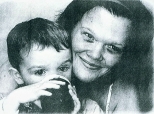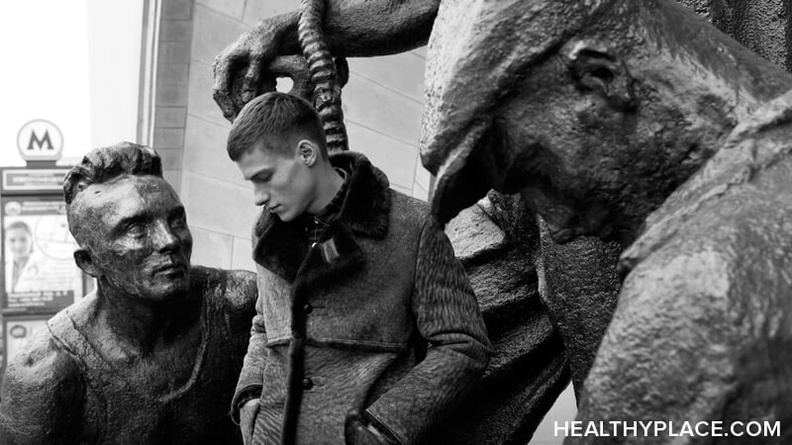The Irrational and Holistically Meaningful Nature of Triggers
 I recently spoke to a friend on the phone who says he can't see me lately because of his mental health problem. Earlier, he told me that he is avoiding hot drinks and hot food because he believes that the heat from them is affecting and damaging his brain. When he avoids hot drink and foods he feels fine and so I told him to do what works for him.
I recently spoke to a friend on the phone who says he can't see me lately because of his mental health problem. Earlier, he told me that he is avoiding hot drinks and hot food because he believes that the heat from them is affecting and damaging his brain. When he avoids hot drink and foods he feels fine and so I told him to do what works for him.
I asked this friend what symptoms he gets when he is drinking hot drinks and eats hot food and he said that he felt less alive and, basically, that he felt more empty. I asked him if he felt empty of emotion or energy. He responded that he felt empty of memory and confirmed to me that his memory was going away. I suggested to him that he may be repressing painful or complex memories, which some people do in order to stay sane. Some exploration and catharsis of bad memories is good, but self-repression isn't all bad and can also be very useful; and helpful.
I also mentioned that he might have a form of OCD (Obsessive Compulsive Disorder), in terms of the avoidance behavior (people with OCD repeat or avoid harmless things, or they fear bad things will happen to themselves or their loved ones if they don't avoid the triggers), but he said it wasn't a compulsion, as he has stopped drinking hot tea and hot food altogether.
Psychological Triggers Aren't All Bad
I explained to my friend that there are such things as triggers - experiences or events - which can bring back bad, painful, or traumatic memories. In his case though, the trigger of hot drinks and food repressed his memory, and therefore doesn't flood or cathartically release it.
However, I felt it was necessary to point out to him, that contrary to the psychotherapeutic view that triggers are linked to bad, painful, or traumatic memories - triggers can be completely irrational and have no causal meaning to them.
When I was very mentally unwell in 2000, before I stayed in a psychiatric hospital for three weeks, I thought that there was something implanted in my computer and television which was firing radiation at me and destroying my brain. There is no psychotherapeutic link to this trigger for me because I only have happy memories of watching TV and using my computer, although it could be argued that those things had stopped me from socializing face-to-face with other people.
The other key thing about triggers is that although they can be irrational and not linked to past or recent bad, painful, or traumatic events, the triggers all make sense and have meaning and explanation when they are all linked up and understood holistically together. This is the approach which is needed in psychotherapy, against the old simplistic, dogmatic, and sometimes inaccurate model.
About the author: Peter Donnelly is an anti-psychiatric campaigner in the UK who advocates a more humanistic approach when it comes to mental health treatment.
next: How to Manage Your Stress in a Bad Economy
~ anxiety-panic library articles
~ all anxiety disorders articles
APA Reference
Staff, H.
(2009, April 27). The Irrational and Holistically Meaningful Nature of Triggers, HealthyPlace. Retrieved
on 2025, November 16 from https://www.healthyplace.com/anxiety-panic/articles/irrational-holistically-meaningful-nature-of-triggers

 Major depression is not a fun disease to have, but it is manageable. Before being diagnosed with depression, I lost relationships that I had, not only with my significant others, but with family members also. No one knew what was going on, and before I received a correct diagnosis for depression, I couldn't explain my behavior to anyone as I couldn't account for what was happening.
Major depression is not a fun disease to have, but it is manageable. Before being diagnosed with depression, I lost relationships that I had, not only with my significant others, but with family members also. No one knew what was going on, and before I received a correct diagnosis for depression, I couldn't explain my behavior to anyone as I couldn't account for what was happening.

 When I started the antidepressant medication, my expectations did not coincide with the reality of what the depression medication is meant to do. Others have brains whose chemistry releases in proper amounts at proper times from the proper places and the signals get sent to the proper destination eliciting the intended response for that part of the brain and circumstance. But those people still have to work at doing and being, becoming and evolving into who they were meant to be. I personally do not believe that antidepressants cause people to commit suicide or think more about suicide. I think they are administered by well-meaning physicians who have never experienced depression, don't know the actual physical feeling of the changes in the brain chemistry, don't understand what the person receiving the antidepressants expectations are (or the expectations of those around that person).
When I started the antidepressant medication, my expectations did not coincide with the reality of what the depression medication is meant to do. Others have brains whose chemistry releases in proper amounts at proper times from the proper places and the signals get sent to the proper destination eliciting the intended response for that part of the brain and circumstance. But those people still have to work at doing and being, becoming and evolving into who they were meant to be. I personally do not believe that antidepressants cause people to commit suicide or think more about suicide. I think they are administered by well-meaning physicians who have never experienced depression, don't know the actual physical feeling of the changes in the brain chemistry, don't understand what the person receiving the antidepressants expectations are (or the expectations of those around that person). I always see my production number worsen when I have a episode of depression. The numbers are done monthly, and you can always tell when I am suffering just by looking at my yearly stats. It is so obvious. I start seeing myself as being worthless, I start isolating from my friends and family. I start telling my friends that they're better off without me because I'm wasting air and space. The usual stuff for a depressed person.
I always see my production number worsen when I have a episode of depression. The numbers are done monthly, and you can always tell when I am suffering just by looking at my yearly stats. It is so obvious. I start seeing myself as being worthless, I start isolating from my friends and family. I start telling my friends that they're better off without me because I'm wasting air and space. The usual stuff for a depressed person. To restate for anyone who will read this, I was hospitalized in mid-October of 2002 for my first ever bout with Major Depression. I had major crises in my life including a business partnership that had gone sideways, serious financial problems brought on by the business difficulties, problems in my marriage and the other stresses of living in the fast pace of U.S. society.
To restate for anyone who will read this, I was hospitalized in mid-October of 2002 for my first ever bout with Major Depression. I had major crises in my life including a business partnership that had gone sideways, serious financial problems brought on by the business difficulties, problems in my marriage and the other stresses of living in the fast pace of U.S. society.